- We All Lose: Obama's Legacy And What It Means For A Trump Presidency
Submitted by John Whitehead via The Rutherford Institute,
“This light of history is pitiless; it has a strange and divine quality that, luminous as it is, and precisely because it is luminous, often casts a shadow just where we saw a radiance; out of the same man it makes two different phantoms, and the one attacks and punishes the other, the darkness of the despot struggles with the splendor of the captain. Hence a truer measure in the final judgment of the nations. Babylon violated diminishes Alexander; Rome enslaved diminishes Caesar; massacred Jerusalem diminishes Titus. Tyranny follows the tyrant. Woe to the man who leaves behind a shadow that bears his form.” ? Victor Hugo, Les Misérables
Let’s talk about President Obama’s legacy, shall we?
This was a candidate who was ushered into office promising hope and change, pledging to put an end to the endless wars that were bankrupting the country (he was actually awarded the Nobel Peace Prize in anticipation of his efforts to bring about world peace), and vowing to put an end of the corporate revolving door that had turned our republic into an oligarchy.
After eight years in office, Barack Obama leaves our nation with a weakened Constitution that has been dealt one crippling blow after another by court rulings and government overreach, with more militarized police empowered to shoot first and ask questions later, with more SWAT team raids, with more government corruption, with more debt than ever before ($19 trillion and rising), with more racial tensions bubbling over into confrontations, with even greater surveillance intruding into the privacy of the citizenry, with less tolerance for free speech and thought, with taxpayers groaning under the weight of even more taxes disguised as fines and fees, with a more “imperial” president empowered to act unilaterally through the use of signing statements and executive orders, with a greater risk of blowback from military occupations, drone strikes and endless wars abroad, and with a citizenry more broken and oppressed than ever.
In other words, Obama leaves our nation worse off than when he took office.
You won’t hear any of this from Obama, who believes he would have been re-elected had he been permitted to run for a third term. Nor will you hear it from the celebrities who are quick to sing Obama’s praises, while likening Donald Trump to Hitler. And you certainly won’t hear it from those who are staging sit-ins, marches and acts of civil disobedience to protest Trump’s election, while having failed to voice even a whisper of protest over Obama’s long list of civil liberties abuses.
Yet the reality we must contend with is that the world is a far more dangerous place today than it was eight years ago, and Obama must shoulder some of the blame for that. As President Harry S. Truman recognized, “The buck stops here.”
How did we come to this?
How did a politician who showed such potential and managed to ignite such positive feelings among the citizenry, young and old alike, go from being a poster child for hope and change to being the smiling face of a government that is blind, deaf and dumb to the needs of its citizens?
Let me answer my own question in a roundabout way by quoting something Meryl Streep said recently in her recent Golden Globe acceptance speech.
Ostensibly taking aim at Trump for imitating a disabled reporter, Streep declared: “This instinct to humiliate, when it’s modeled by someone in the public platform, by someone powerful, it filters down into everybody’s life, because it kind of gives permission for other people to do the same thing. Disrespect invites disrespect. Violence incites violence. And when the powerful use their position to bully others, we all lose.”
Streep is right in one sense.
We all lose when the powerful inflict violence, humiliation, disrespect on others.
However, where Streep goes wrong is in failing to recognize that “we the people” have been on the losing end of this relationship long before Trump’s name was even being batted about as a possible candidate for the White House.
Indeed, the agents of the Obama administration—many of whom belong to that permanent government bureaucracy that is unaltered by elections and flows in a continuous line from one president to another—have been consistently and persistently inflicting violence, humiliation and disrespect on the citizenry for the past eight years.
Every time a SWAT team funded by government grants crashes through a door, that’s an infliction of violence. Every drone strike that kills innocent civilians is inflicting violence on the less powerful. Every roadside stop that ends with an unwarranted strip search is inflicting humiliation on the less powerful. Every law that criminalizes the speech or activities of those whose views may not jibe with the mainstream is tantamount to government-sanctioned bullying.
So for those lamenting the perils of a Trump presidency, who have been quick to blame racism, sexism and even the Russians for Trump’s electoral victory, you might want to consider the old Native American proverb that says “every time you point a finger in scorn—there are three remaining fingers pointing right back at you.”
As civil rights activist Cornel West concluded, “The reign of Obama did not produce the nightmare of Donald Trump – but it did contribute to it. And those Obama cheerleaders who refused to make him accountable bear some responsibility.”
West goes on to document the many missteps that contributed to Obama’s failed legacy: his allegiance to Wall Street, the drone strikes that have killed innocent civilians, the demonization of whistleblowers, the killing of U.S. citizens without due process, and his refusal to hold police accountable for excessive force and civil rights violations among others.
As West writes for The Guardian:
“[T]he mainstream media and academia failed to highlight these painful truths linked to Obama. Instead, most well-paid pundits on TV and radio celebrated the Obama brand. And most black spokespeople shamelessly defended Obama’s silences and crimes in the name of racial symbolism and their own careerism. How hypocritical to see them now speak truth to white power when most went mute in the face of black power. Their moral authority is weak and their newfound militancy is shallow.”
Let me also say that this is not only an indictment of all that Obama has failed to do in the past eight years. It is also an indictment of those administrations prior to Obama, Democrat and Republican alike, which have contributed to our present sorry state of affairs. And it is a warning to Trump as he begins to carve out a path for his own administration.
Every time I write one of these diatribes about the government, I’m always asked “what can I do to push back against the government?”
My answer, which I flesh out in greater detail in my book Battlefield America: The War on the American People, is always the same: When all is said and done, politicians are only as effective, trustworthy and accountable as they are made to be. And they are only made to be effective, trustworthy and accountable when the citizenry stays engaged, informed and active in the workings of government.
One of the best models I know for a citizen who took the duties of citizenship to heart every moment of the day was my good friend, mentor and hero Nat Hentoff—one of the nation’s most respected, controversial and uncompromising writers and a lifelong champion of the First Amendment—who passed away on Saturday, January 7, 2017, at the age of 91.
Nat was a radical in the best sense of the word, a feisty, fiercely loyal, inveterate freedom fighter and warrior journalist with a deep-seated intolerance of injustice and a love of America that weathered the best and worst this nation has had to offer.
Nat didn’t live to see the last days of Obama’s reign, but he saw enough to describe the nation’s 44th president as “possibly the most dangerous and destructive president we have ever had.” A few years back, I asked Nat how he maintains his optimism in the face of the constant barrage of discouraging news about government corruption, civil liberties abuses, war, etc.
I’ll end with Nat’s answer as he inscribed it in the foreword to my book A Government of Wolves: The Emerging American Police State:
Government officials like to claim that everything they are doing is for security, to keep America safe in the so-called war against terrorism. What they are really effectuating is a weakening of why we are Americans. A lot of Americans today have a very limited idea as to why they are Americans, let alone why we have a First Amendment or a Bill of Rights. People are becoming accustomed or conditioned to what's going on now with the raping of the Fourth Amendment, for example. Too many Americans appear unconcerned about the loss of fundamental individual liberties—such as due process, the right to confront their government accusers in a courtroom, and the presumption of innocence—that are vital to being an American. Yet the reason we are vulnerable to being manipulated by the government out of fear is that most of us do not know and understand our liberties and how difficult it was to obtain them and how hard it is to keep them.
I have spent a lot of time studying our Founders and people like Samuel Adams. What Adams and the Sons of Liberty did in Boston was spread the word about the abuses of the British. They had Committees of Correspondence that got the word out to the colonies. We need Committees of Correspondence now. The danger we now face is admittedly greater than any we have had before. If I were to judge what I do and write on the basis of optimism, I would probably go back to writing novels, but I figure you have to do what you feel you have to do and just keep hoping and trying to get people to understand why we are Americans and what we are fighting to preserve.
- Venezuela Hikes Minimum Wage By 50% "Due To Economic War And Mafia Attacks"
With (hyper)inflation expected to hit 1,660% this year and 2,880% next, Venezuela's President Maduro hiked the minimum wage another 50% on Sunday, the fifth increase in the past year (for a total annualized increase of 536%), to help shield workers from 'economic war'.
As Reuters reports, the measure puts the minimum monthly salary at 40,683 bolivars – about $60 at the weakest exchange level under the state's currency controls, or $12 at the black market rate.
"To start the year, I have decided to raise salaries and pensions," he said on his weekly TV and radio program.
"In times of economic war and mafia attacks … we must protect employment and workers' income," added Maduro, who has now increased the minimum wage by a cumulative 322 percent since February 2016.
The 54-year-old successor to Hugo Chavez attributes Venezuela's three-year recession, soaring prices and product shortages to a plunge in global oil prices since mid-2014 and an "economic war" by political foes and hostile businessmen.
But critics say his incompetence, and 17 years of failed socialist policies, are behind Venezuela's economic mess.
They say the constant minimum wage hikes symbolize Maduro's policy failures and fail to keep pace with real on-the-street price rises.
Fox News also notes that Venezuela's biggest employer, Fedecamaras, said that the pay increase was announced "without consultation" by the government and could reduce employment and result in the closure of companies that cannot deal with the hike.
And while the black market Bolivar rallied briefly as the bank-note ban debacle was put in place, the currency's street worth is collapsing once again…
But, as The Washington Post reports, while the government has been able to censor the country’s main newspapers, so you won’t read much about crime in the media, death is one of the few guaranteed things you can find in Venezuela.
There are no official tallies of deaths related to violence, but some NGOs put last year’s national death toll as high as 24,000, which would make a total of 252,000 deaths since the revolution came to power 17 years ago.
There are an estimated 200,000 members of the Venezuelan security forces, but it doesn’t seem like that is enough.
Violence permeates everyday life here. In the streets, gangs clash with one another, with the police and with the army. Sometimes, police even clash among themselves. All of these factions wield power and abuse it. Caught in the middle of all of this, ordinary citizens buy guns to protect themselves. Whether it’s the loss of a friend or a relative, everyone here has been touched by violence. Death is in the air.
Venezuela is a country that seems to be at war with itself. It’s not always clear who is who. It’s hard to know who to trust or who your enemy is, so you’re always looking over your shoulder, waiting for the next blow, unsure of where it will come from. Violence has so saturated life here that people have begun to see it as normal.
- CNN Is Now Least Trusted News Network Among Viewers
A recent poll of cable news network viewers found that CNN’s regular audience is far more skeptical of the political news they receive than Fox News fans.
In the poll published Wednesday by Rasmussen Reports, 1,000 likely voters were asked to describe their media viewing habits. Seventy-five percent said they watch at least some form of cable news each week, with 42 percent saying they most frequently watch Fox News, 35 percent usually choosing CNN, and 19 percent favoring MSNBC.
An even 50 percent of frequent Fox News viewers agreed with a followup question, “Do you trust the political news you are getting?” By comparison, 43 percent of frequent MSNBC viewers and just 33 percent of those who mostly watch CNN said they trust their political news.
According to a November survey by Rasmussen, 37 percent of voters still say they get most of their news from cable news networks. Voters in general were highly critical of the election coverage, with the strongest criticism coming from the 7 percent of those polled who said they mostly get their news from social media, rather than TV.
While once considered a pioneer of 24-hour TV journalism, CNN has faced criticism and accusations of bias over its political news coverage. During the 2016 election cycle, some viewers and analysts claimed CNN focused too much attention on the candidacy of Donald Trump, even to the point that it negatively impacted other candidates. Trump’s former campaign manager, Corey Lewandowski, worked at CNN for months as an on-air personality while maintaining notably close ties to the candidate.
In April, Bernie Sanders supporters protested outside of CNN’s offices in Hollywood, claiming the network’s reporters ignored their candidate. In October, CNN cut ties with frequent contributor-turned-interim Democratic National Committee Chair Donna Brazile after WikiLeaks’ archive of Hillary Clinton’s emails revealed Brazile gave Clinton advance notice of debate questions.
Since the election, CNN has been quick to embrace President-elect Trump. On Dec. 2, CNN reporter Cristina Alesci praised Trump’s advisory board of wealthy CEOs, calling it a “historic” gathering. She continued:
“I don’t think that I’ve ever seen anything quite like this before. … Like I said before, this list really represents a bipartisan group of people, so he’ll have some very diverse viewpoints to tap into.”
The president-elect has surrounded himself with a cadre of wealthy advisors and Cabinet members, prompting many critics to question just how much diversity they’ll actually bring to the table. “The very definition of corporate media diversity: the entire spectrum of opinion, from GE to GM,” quipped Steve Rendall, a reporter for the media analysis organization Fairness and Accuracy in Reporting, on Dec. 2.
In September, FAIR also accused CNN of spreading a false claim about Black Lives Matter protests being stoked by “outside agitators” in Charlotte, North Carolina, which quickly went viral among conservatives.
From their close ties to politicians to the apparent agendas pushed by paid pundits, viewers are wise to question the political news they receive from any major TV news network.
- Redneck Investin Part 5 – Muny over Yonder
Many investors who aren’t ECP simply can’t access decent strategies for investing and practically, if you only have $100,000 to invest, it’s really not worth it in today’s world (better to ‘invest’ in your own living conditions, vehicle, tools, and other things you might actually need). You don’t need to be a redneck to follow these simple rules, but if you want to run a ‘redneck check’ on yourself, here’s a list of signs you might be a redneck IF:
1) Your neighbor dug a big hole in his backyard he calls a ‘mud hole’ which is used on weekends. He fills it with water and lets it sit for days, creating a ‘mud soup’ and then invites his friends over with their trucks as they drive through it one by one, until one turns over or the engine dies.
2) Your other neighbor burns their garbage, plastic bags and all.
3) You need a monster truck to access your property.
4) You don’t have a bank account because you ‘don’t trust them suns a bitches.’
5) You’ve invested more than 50% of your yearly disposable income in your truck.
- Southern: Eating honeysuckle
- Redneck: Chewing tobacco
- Southern: Playing barefoot outside with your friends as a kid
- Redneck: Going to the grocery store barefoot
- Southern: Having a truck
- Redneck: Having any of the following on your truck: a lift kit, a Confederate flag, or any sticker that talks about guns, has the word “pussy”, or actually labels you as a “redneck”.
- Southern: Food with a lot of butter
- Redneck: Food with a lot of mayonnaise
- Southern: Common family nicknames include “Junior” and “Sissy”
- Redneck: Common family nicknames include “Bubba” and “Buzz”
- Southern: Cracker Barrel
- Redneck: Golden Corral
- Southern: Elvis, Johnny Cash, The Allman Brothers, Lynard Skynard
- Redneck: David Allan Coe, Toby Keith, Trace Adkins
- Southern: Having pecan pie crumbs on your mouth
- Redneck: Missing teeth from your mouth
- Southern: Having at least one relative (even if distant and you’ve met them once) who owns horses
- Redneck: Having at least one relative who’s had sex with a horse
- Southern: Having an innocent crush on one of your cousins as a kid
- Redneck: Doing literally anything about that crush
- Southern: Tailgating before a game
- Redneck: Tailgating without having tickets to the game and watching it on a TV in the parking lot
- Southern: Sweet tea
- Redneck: Mountain Dew
- Southern: Drinking moonshine borderline ironically on special occasions like weddings or weekend trips to the mountains
- Redneck: Consuming moonshine regularly like it’s not even a thing
So here’s part 5 in our series Redneck Investin’ – for the ‘other’ America:
Ways to get money, food, a place to live, and other highlights of life in USA
Free Cash – Sites like Free Money Claims www.freemoneyclaims.com , www.pleaseorderit.com/free – and many others, offer the ability to get free money. Who doesn’t like free money? Yes, it can be a big waste of time. But you’ve got plenty of time – you’re unemployed, on the dole, and Wrastlin’ doesn’t come on for another 3 hours!
Food Stamp Arbitrage – THIS IS ILLEGAL – DO NOT TRY THIS AT HOME. Many rednecks trade food stamp products for cash at a huge discount, sometimes even 50%. But they have no choice, as who else is going to pay them for 100 cases of Coca Cola but their local Quik-e-mart.
Panhandling – THIS IS ILLEGAL – DO NOT TRY THIS AT HOME. You know the best parking lots, the best clothes to wear – to evoke that human nature in people. Make that man shell out all the cash in his wallet, because he feels bad for you. Keeping the family in the car is a big plus! Take his plastic too. DISCLAIMER – Sadly, these untrained panhandlers would fare better on Wall St. where they would be paid millions to do the same job but in a different context.
Friends are for MUNY – Rednecks have no shame to just flat out ask you for money. If you refuse for a reason such as ‘I don’t use cash’ they offer a host of solutions such as ‘oh you can write me a check, thanks.’ There’s not a friend they won’t abuse with this question but it’s also a bit of a ‘redneck test’ because if you are a true redneck, you’d ask the friend first.
Craigslist FREE – Really, the average person would be shocked what people give away on Craigslist. Here in the south, it’s common to find things like Televisions, Wood crates, furniture, couches, cats, bicycles, and other stuff completely free. People just want to get rid of their junk.
Metal Scrapin’ – Dismantling America’s dwindling infrastructure one railroad tie at a time. This can be an environmentally friendly and profitable hobby if done LEGALLY. If you ASK people they will often have metal you can take with their permission for FREE – such as old appliances, old excercise equiptment, shopping carts, wheelchairs, all kinds of stuff. Stealing metal is illegal and potentially dangerous, every year in the South there are at least a small handful of deaths or near deaths of copper wire theives getting electrocuted, and in LA too. Even though the price of scrap metal is near an all time low – they still pay. Haul it over to the yard!
For more on this series, see:
Redneck Investin Part 4 – Free on the Fringe
Redneck Investin Part 3 – Get R Dun
Redneck Investin Part 2 – The evolved Redneck – READ before RIOT
Redneck Investin Part 1 – A look from the other side
If you order stuff online, checkout PleaseOrderIt.com which provides special discounts, savings, coupons, and free stuff too! For a guide to the markets and how to survive with only a small amount to invest, checkout Splitting Pennies only $6.11 on Amazon.

- State Department Says Presenting Evidence Of Russian Hacking Would Be "Irresponsible"
One recurring lament throughout the theatrically dramatic campaign involving reports and emotional appeals by US intelligence agencies such as the CIA (whose primary function is the creation of disinformation) to ordinary Americans, that Russia had “hacked the US presidential election” is that for all the bluster and “conviction”, there has been zero evidence.
And, as it turns out, there won’t be any, because according to the US State Department, US intelligence agencies were right to not reveal evidence of their proof that Russia interfered in US elections, and comparisons with intelligence reports that Iraq had WMDs were not relevant in the current year.
Asked by RT’s Gayane Chichakyan if Friday’s public intelligence report should have contained any proof of Russian intervention, State Department spokesman John Kirby said that no one should be surprised that US intelligence agencies were keeping evidence secret in order to protect sources and methods.
“Most American people understand that they have the responsibility to protect their sources and methods,” Kirby said, adding it would be “irresponsible” to do otherwise. Actually, with the Iraq WMD fiasco strill fresh in “American people’s” minds, it is irresponsible to think most Americans are still naive idiots who will believe whatever the “intelligence agencies” will tell them.
Alas, none of that has filtered through to the appropriate authorities, and Kirby said that it was “up to the agencies to decide which information they share with the public. We rely on them to make that determination for themselves.” And, in this case, it meant sharing no information at all.
The assessment in Friday’s report was made “by all 17 intelligence communities. All of them came to the same basic conclusion: that Russia interfered in the US election,” Kirby said. “All of our intelligence communities came to the same basic conclusion, over and over again.”
They just couldn’t prove it, instead hoping that by repeating the same statement over and over would be sufficient.
Furthermore, the actual report, describes itself as an “analytic assessment drafted and coordinated among The Central Intelligence Agency (CIA), The Federal Bureau of Investigation (FBI), and The National Security Agency (NSA).”
Russian President Vladimir Putin and his government “aspired to help President-elect Trump’s election chances when possible by discrediting Secretary Clinton and publicly contrasting her unfavorably to him,” the agencies assert in the report, noting that the CIA and FBI have “high confidence” in this judgment, while the NSA – which, in theory, would have actual surveillance data to prove the assertion – had only “moderate” confidence.
Secretary of State John Kerry “believes strongly that they handled this matter in the appropriate way, in terms of how it was analyzed, how it was presented, and how it was briefed to those who needed to see a deeper level of information,” Kirby said.
When Chichakyan brought up the 2003 intelligence assessment on the Iraqi weapons of mass destruction – invoked by the Bush administration to justify the US invasion and occupation of that country – Kirby said the comparison was irrelevant, since that was a long time ago.
“We have moved on. We have learned a lot from those mistakes,” he said.
Ironically, somehow much of America ended up with the opposite conclusion.
- Trump Backs Delay Of Obamacare Repeal After Pressure From Rand Paul
As we reported earlier today, while many items on the Trump agenda for both the “first day” and the rest of 2017, could take a substantial amount of time and effort before they are legislated and implemented, one thing that there was virtually unanimous consensus on, was that Trump would immediately launch the repeal of Obamacare, even if replacing the Affordable Care Law would take considerably longer (as it would require bipartisan support).

However, it now appears that even the prompt repeal of Obamacare is in question as Trump has now backed waiting to repeal the Affordable Care Act until a replacement proposal is in hand, following in a Friday night phone call with Rand Paul, the Kentucky Republican said Monday, adding to momentum for changing GOP leaders’ strategy on dismantling the 2010 health-care law.
Paul has emerged a vocal leader of a growing group of Republican senators expressing concerns with GOP plans to vote to repeal the health law early this year, then to hammer out over weeks or months what would replace it after a two- to three-year transition. Cited by the WSJ, Paul said in an interview “I believe we should vote on replacement the same day we vote on repeal,” and added that Trump called the senator on Friday night “to say he agrees completely.”
As the WSJ adds, a Trump transition official confirmed that the incoming president spoke with Mr. Paul on Friday, and said meetings are under way to determine how a replacement law could be approved at the same time—or close to it—that a repeal of the law is approved. Last week, Trump personally warned congressional Republicans on Twitter to “be careful” about the political consequences of moving quickly to repeal the law.
The push from both Trump and Paul, as well as at least five other GOP senators, will put pressure on Republican leaders to accelerate the process of crafting a unified GOP replacement plan. Republicans have proposed dozens of ideas over the years for overhauling the health-care system but have yet to coalesce around a plan.
In other words, in a shift on a popular Nency Pelosi statement, the Republicans “will not repeal it eventually come up with a replacement“, but will do both at the same time. The question now is how long such a unified process could take.
Senate Majority Leader Mitch McConnell, who met with Mr. Trump in Trump Tower on Monday morning, appeared to indicate Sunday that Republicans were accelerating the process of settling on a replacement plan.
“We will be replacing it rapidly after repealing it,” the Kentucky Republican said Sunday on CBS. He wasn’t specific about the timing of the drafting of a new health-care system, or what it would entail, but he said, “There ought not to be a great gap between the first step and the second.”
Trump has said before that he wanted to “simultaneously” repeal and replace the health-care law, but GOP leaders on Capitol Hill hadn’t committed to that timeline.
One thing is clear: both repealing and replacing the health law would be complicated legislative maneuvers with sweeping repercussions for both the health-care industry and millions of American consumers. It could also take years, and keep Obamacare in its current form for a long time, contrary to Trump’s campaign promises.
Reince Priebus said on Sunday that a new health plan might not be ready immediately after gutting the Affordable Care Act. “It may take time to get all the elements of the replacement in place,” Mr. Priebus said on CBS. “The full replacement may take more time than an instantaneous action.”
As reported previously, Republicans are planning to use a special process tied to the budget to pass legislation repealing the health law with a simple majority, but they can afford to lose few GOP votes. They would need all Republicans and several Democratic votes to then approve any replacement health-care system, in order to reach the 60 votes needed to clear the chamber’s procedural hurdles. Paul, who has objected to the budget maneuver over its spending levels, said that he would like to see what would replace the health law weeks later, after House and Senate committees have detailed how the ACA would be repealed. The budget specifies that they must produce their legislation by Jan. 27.
Meanwhile, in a separate article, Bloomberg reports that top advisers to President-elect Donald Trump will meet Monday evening with House Speaker Paul Ryan and his policy staff to discuss taxes and other policy issues, according to two people familiar with the plans. Topics on the agenda include tax reform, the budget, infrastructure and Obamacare.
As a reminder, tax reform was the other item that Trump is expected to be able to enact relatively painlessly.
Ryan and his team intend to walk through the tax reform plan House Republicans put forward last year, calling it a “priority issue” for the House and the president-elect, according to the other person, a Republican aide. House Ways & Means Committee Chair Kevin Brady will be the House Republicans’ point person on tax reform, the aide said. According to Bloomberg, though Trump and Ryan agree on plenty, points of contention include tariffs for companies that move jobs overseas, a $1 trillion infrastructure plan, as Trump has called for, and how many people an Obamacare replacement should insure.
Present at the meeting will be all the top economic Incoming White House aides Reince Priebus, Stephen Miller, Stephen Bannon, Jared Kushner and, of course, former Goldman President Gary Cohn.
- FBI Quietly Releases 300 Documents Pertaining To Hillary Clinton Investigation
Submitted by Joseph Jankowski via PlanetFreeWill.com,
While most Americans were likely watching the 74th Annual Golden Globes Awards and NFL football, the FBI quietly released another several hundred pages of documents from its investigation of Hillary Clinton’s private email server on Sunday night.
FBI quietly releases new Hillary Clinton investigation documents (part 5) [as yet, no announcement] https://t.co/lmyWF5rA8H
— WikiLeaks (@wikileaks) January 9, 2017
The documents deal with the handling of computer hardware collected from Clinton’s lawyers for the investigation and also contains emails from FBI officials discussing the classification of Clinton’s emails.
This is the fifth dump of Clinton investigation records which can be found at the FBI’s Vault website where the agency provides information about high-profile Freedom of Information Act (FOIA) releases.
Chuck Ross of the Daily Caller reports:
The emails included in the documents are from the months prior to the formal opening of the Clinton email probe, which occurred on July 10, 2015. The exchanges show disagreements between the FBI and State Department over whether some of Clinton’s personal emails should be classified.
In one April 27, 2015 email, an FBI official wrote to other officials that they were “about to get drug into an issue on classification” of Clinton’s emails. The official, whose name is redacted, said that the State Department was “forum shopping,” or seeking a favorable opinion on the classification issue by asking different officials to rate emails as unclassified.

From FBI document release
Other email traffic sheds light on a controversy involving State Department under secretary for management Patrick Kennedy and a request he made in 2015 that the FBI reduce its classification of a Clinton email related to the Sept. 11, 2012 attacks in Benghazi.
Clinton investigation notes released by the FBI in October showed that an FBI official said during an interview as part of the email probe that Kennedy asked him and others at the FBI to relax classifications on some emails.
The under the radar release also contains a May 21, 2015 email in which the FBI’s assistant director of the counterterrorism division, Michael Steinbach, details a conversation with Patrick Kennedy on classification.
In the email, Steinbach recommended that one of Clinton’s emails be classified using b(1) and b(7) redactions, a technique used to protect information in the interest of national defense. Kennedy was asking Steinbach to allow just b(1) redactions.
An unnamed official said that the email in dispute by Kennedy and Steinbach could disclose sources and investigative methods used by the bureau, according to the released documents.
The official also added that the disputed email was redacted and classified on the rationale that it contained information that would cause “interference with foreign relations.”
“While the email does not name the particular official, this might be deduced and, given the threat of violence in the region, any surmise could be fatal for whoever cooperated with us,” the official wrote.
“State will say no one will know if it is redacted, but that is not how classification works,” they added.
More information will be coming out about this document dump as the week progresses, but don’t expect the MSM to harp on it at all. Remember the Russians are coming…
The FBI has not yet announced the release of the documents.
Read the latest Clinton files below:
- PReCiouS BoDiLY FLuiDS…
- Obama Finally Admits He Bears "Some Responsibility" For The Dems' Staggering Losses Since 2008
On the verge of his last days in the White House and in a rare display of humility, President Obama admitted to ABC’s George Stephanopoulos over the weekend that it is possible, just maybe, that he, and the epic failure of his crowning piece of legislation, Obamacare, could have contributed to the stunning collapse of the Democratic party over the last 8 years. Well, at least he kind of admitted it before enumerating all the reasons he couldn’t possibly be to blame…but it’s a step in the right direction.
“I take some responsibility on that. I think that some of it was circumstances. If you look at what happened, I came in in the middle of the worst financial crisis since the Great Depression. And unlike FDR who waited — well, didn’t take office until about three years into the Great Depression, it was happening just as I was elected. I think we did a really good job in saving this economy and putting us back on the track of growth. But what that meant is in 2010 there were a lot of folks who were still out of work. There were a lot of folks who had lost their homes or saw their home values plummet, their 401k’s plummet. And we were just at the beginnings of a recovery. And the, you know, whoever is president at that point is going to get hit, and his party’s going to get hit. That then means that suddenly you’ve got a redistricting in which a lot of state legislatures are now Republican. They draw lines that give a huge structural advantage in subsequent elections. But what I think that what is also true is that partly because my docket was really full here, so I couldn’t be both chief organizer of the Democratic Party and function as commander in chief and president of the United States. We did not begin what I think needs to happen over the long haul, and that is rebuild the Democratic Party at the ground level.”
And while Obama would like for you to believe that the prolonged “great recession” caused all of those Democrats losses in Congress and state legislatures, he seems to be “mis-remembering” history. The “great recession” is precisely what catapulted Obama into the White House and resulted in massive Democratic majorities in both the House and Senate in 2008. The Democratic losses in the House and State Legislatures across the country didn’t come until the mid-term elections, two full years later in 2010, as Democrats were forced to go out and campaign just after passing the unpopular and wildly controversial Obamacare.
The Washington Post even created this handy graphic which charts the losses by year.
Moreover, if Democrat losses in 2010 were, in fact, attributable to the “great recession”, and given that Mr. Obama constantly likes to remind us that he has presided over a staggering “economic recovery” over the past 8 years, perhaps he can explain why Democrats have continued to lose seats throughout his presidency. Surely Democrat misfortunes should have reversed in 2012 when it became glaringly obvious that his economic policies were “working,” right?
And here is the full interview with George Stephanopoulos:
Digest powered by RSS Digest
























































































































 Meanwhile, an earlier look through the suspect’s Facebook feed led to another video of the same assailants abusing another Trump supporter in a similar attack. During the attack, the victim is made to kiss the floor and say “F*ck Donald Trump” at knifepoint.
Meanwhile, an earlier look through the suspect’s Facebook feed led to another video of the same assailants abusing another Trump supporter in a similar attack. During the attack, the victim is made to kiss the floor and say “F*ck Donald Trump” at knifepoint. 
































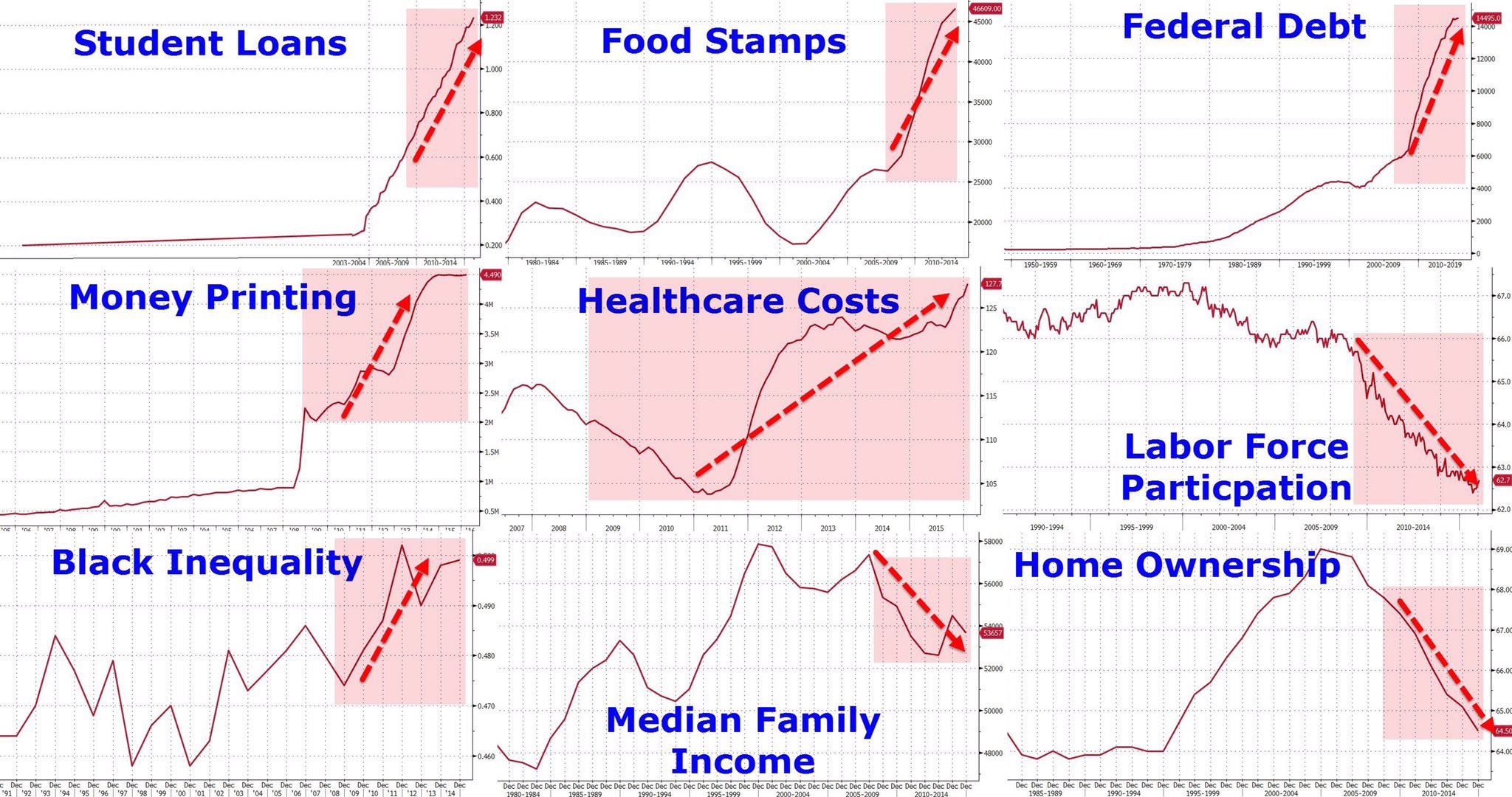















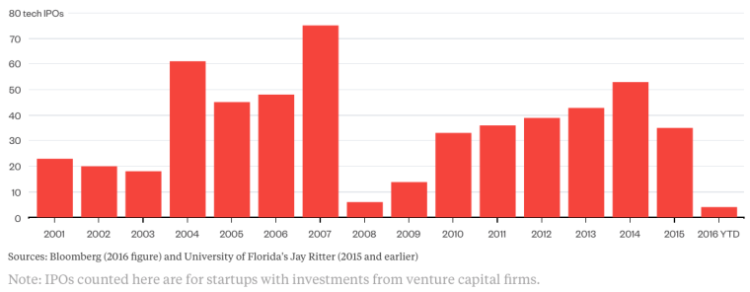
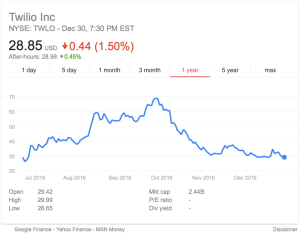
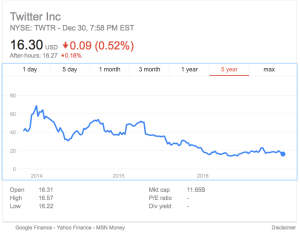
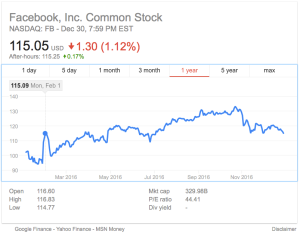















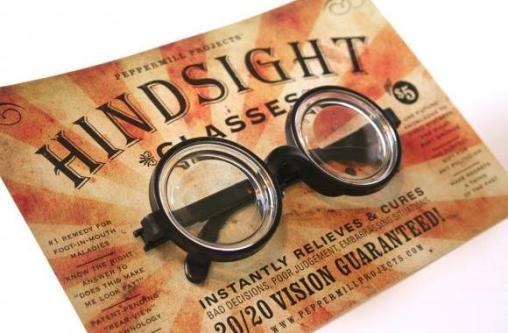

































![By ECB - European Central Bank (Flickr.com) [CC BY 2.0 (http://creativecommons.org/licenses/by/2.0)], via Wikimedia Commons](https://i0.wp.com/thegreatrecession.info/blog/wp-content/uploads/Mario_Draghi_2013.jpeg?resize=428%2C599)
 Saving...
Saving...